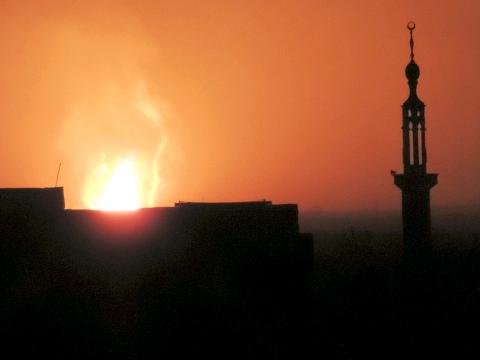Syria was set to hand over a detailed plan for destroying its chemical arsenal yesterday, the international watchdog says, as a rebel attack near Damascus triggered power outages across the country.
However, prospects for a peace conference, which the UN is trying to convene in parallel with the disarmament process, looked dim after key opposition leaders spurned efforts by Western and Arab powers to persuade them to attend.
On the ground violence raged unabated on Wednesday, with rebels striking a gas pipeline that caused blackouts across Syria.

Photo: Reuters
A correspondent in Damascus said that he could see a huge fire blazing close to the airport, which is near the affected power station.
“A terrorist attack on a gas pipeline that feeds a power station in the south has led to a power outage in the provinces, and work to repair it is in progress,” state news agency SANA quoted Syrian Minister of Electricity Emad Khamis as saying.
The Syrian Observatory for Human Rights said that besides the Damascus region, power outages were reported in Aleppo and Homs.
“It is likely this was a large-scale operation planned well in advance,” Observatory director Rami Abdel Rahman said.
Last month, a similar outage was caused after a high voltage power line was sabotaged.
Also on Wednesday, a car bomb hit a checkpoint in a western suburb of Damascus, causing multiple casualties among the troops manning it, the Observatory said, and rebels shelled two of Damascus’ main squares killing five people and wounding at least 22.
Meanwhile the Organisation for the Prohibition of Chemical Weapons (OPCW) said that the Syrian government was expected to hand over its disarmament plan to them by yesterday.
The plan is the next step for Damascus under the terms of a US-Russian deal to head off military strikes on Syria that calls for all its chemical weapons and production facilities to be destroyed by the middle of next year.
“We expect Syria’s initial declaration of its chemical weapons program within the next 24 hours,” spokesman Michael Luhan told reporters on Wednesday in The Hague, where the OPCW is based.
Syrian President Bashar al-Assad’s regime has already handed over an inventory of its chemicals, weapons and facilities, and a joint UN-OPCW team has been in Syria since the start of the month inspecting and destroying them.
The team has now checked 18 of 23 declared sites in Syria, destroying production equipment at almost all of them, Luhan said.
However, parallel efforts by the UN to convene a peace conference in Geneva next month have run into resistance from the opposition, who are insisting on a raft of preconditions.
Leaders of the National Coalition — the main opposition umbrella group — insisted they will not attend unless regime change and al-Assad’s departure are on the table.
A meeting in London on Tuesday between opposition leaders and 11 governments from the Friends of Syria group produced little more than a joint statement that al-Assad should play no future role in government.

Nauru has started selling passports to fund climate action, but is so far struggling to attract new citizens to the low-lying, largely barren island in the Pacific Ocean. Nauru, one of the world’s smallest nations, has a novel plan to fund its fight against climate change by selling so-called “Golden Passports.” Selling for US$105,000 each, Nauru plans to drum up more than US$5 million in the first year of the “climate resilience citizenship” program. Almost six months after the scheme opened in February, Nauru has so far approved just six applications — covering two families and four individuals. Despite the slow start —

MOGAMI-CLASS FRIGATES: The deal is a ‘big step toward elevating national security cooperation with Australia, which is our special strategic partner,’ a Japanese official said Australia is to upgrade its navy with 11 Mogami-class frigates built by Japan’s Mitsubishi Heavy Industries, Australian Minister for Defence Richard Marles said yesterday. Billed as Japan’s biggest defense export deal since World War II, Australia is to pay US$6 billion over the next 10 years to acquire the fleet of stealth frigates. Australia is in the midst of a major military restructure, bolstering its navy with long-range firepower in an effort to deter China. It is striving to expand its fleet of major warships from 11 to 26 over the next decade. “This is clearly the biggest defense-industry agreement that has ever

DEADLY TASTE TEST: Erin Patterson tried to kill her estranged husband three times, police said in one of the major claims not heard during her initial trial Australia’s recently convicted mushroom murderer also tried to poison her husband with bolognese pasta and chicken korma curry, according to testimony aired yesterday after a suppression order lapsed. Home cook Erin Patterson was found guilty last month of murdering her husband’s parents and elderly aunt in 2023, lacing their beef Wellington lunch with lethal death cap mushrooms. A series of potentially damning allegations about Patterson’s behavior in the lead-up to the meal were withheld from the jury to give the mother-of-two a fair trial. Supreme Court Justice Christopher Beale yesterday rejected an application to keep these allegations secret. Patterson tried to kill her

MILITARY’S MAN: Myint Swe was diagnosed with neurological disorders and peripheral neuropathy disease, and had authorized another to perform his duties Myint Swe, who became Myanmar’s acting president under controversial circumstances after the military seized power from the elected government of Aung San Suu Kyi more than four years ago, died yesterday, the military said. He was 74. He died at a military hospital in the capital, Naypyidaw, in the morning, Myanmar’s military information office said in a statement. Myint Swe’s death came more than a year after he stopped carrying out his presidential duties after he was publicly reported to be ailing. His funeral is to be held at the state level, but the date had not been disclosed, a separate statement from the